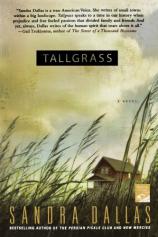Tallgrass
Review
Tallgrass
Already being compared to David Guterson's SNOW FALLING ON CEDARS, Sandra Dallas's seventh novel is a venerable blend of historical fact and engrossing fiction, set in a rural Colorado town during World War II. A book that will surely resonate with contemporary readers because of its global focus yet small town feel, TALLGRASS both teaches and entertains in equal measures.
Told from the point of view of 13-year-old Rennie Stroud, TALLGRASS is the story of Ellis, Colorado, and what unforeseen changes take place there after thousands of Japanese dissidents from the West Coast are relocated to the town's newly constructed internment camp, following the bombing of Pearl Harbor. In the opening chapter, Dallas seamlessly articulates the mood of the town when describing its residents' reaction to the arrival of these never-seen-before strangers. "I expected them to look like the cartoons of Hirohito in the newspaper, with slanted eyes and buckteeth and skin like rancid butter," Rennie says. "I think they ought to 've shipped them to Japan," yells a local farmer to a reporter for the Denver Post. Aside from a few supporters (including Rennie's parents), most of the townsfolk are afraid of the "Japs" and want nothing more than for them to "go back where they came from" (ignoring the fact that they came from California).
As the weeks and months go buy and it becomes clear that the newcomers won't be leaving anytime soon, the people of Ellis grow increasingly agitated by their presence. "No Japs Allowed" signs are posted on storefronts. Violence breaks out on more than one occasion. Anti-Japanese farmers turn against their more tolerant neighbors. Once a sleepy, copasetic community, Ellis is slowly turning into its own veritable war zone.
Then the unthinkable happens. A crippled white girl (Rennie's age) named Susan is found brutally murdered in a barn --- raped and "ravished," her throat cut. Right away, as if fuel for the fire, the Japanese are blamed (despite any proof), and a manhunt forms to ferret out her killer.
Meanwhile, there are other pressing matters afoot. World War II is raging overseas, and local (as well as global) concerns are impacting every family. Young men are enlisting or being drafted (including Rennie's older brother, Buddy), leaving a shortage of capable hands on deck at the farms. In a move spearheaded by Rennie's father, boys from the internment camp are hired in their place to work in the fields and Japanese girls to work in the kitchens. This, of course, deeply angers many of Ellis's bull-headed and feeble-minded constituents, causing tensions to escalate even further between families.
Finally, in a series of surprising twists and turns, Susan's murder is solved (it's not who you think!) and more than a few lives are irreparably altered by the outcome ---for better or worse. As Dallas expertly ties up loose ends in the Epilogue, readers will feel vindicated --- a welcome sense of relief that justice has been served.
For the most part, TALLGRASS works because of its protagonist. Although young, Rennie insists on looking at the world with wide-open eyes. Her urge to grasp the "why" of something so large and all-encompassing as prejudice is truly what makes her the ideal narrator and, ultimately, the reason why the book succeeds. We root for Rennie in her will to understand the world, and we admire her parents for their strength and courage to raise her.
What also makes TALLGRASS so captivating is Dallas's clear sense of the time period. With character names like Marthalice and others like the ever-meddling group of clucking busybodies called The Jolly Stitchers (a group of Quilters), Dallas has imagined the quintessential small western town down to its most podunk detail. Her knack for dialogue is uncanny --- she nails the Southern/Western, hick-like drawl perfectly --- and the pace at which the lines are delivered is spot-on and ripe for the screen.
In the end, what readers will come away with is a glimpse of how one place was affected by war, and how its inhabitants both fought and pulled together in times of great fear and sadness. Dallas does a great job in steering clear of what she knows nothing about --- mainly, what it feels like inside the internment camp. She doesn't presume to understand what the Japanese (Americans, mind you) are thinking. But she does present a fairly realistic picture of what can happen if people are pushed to turn against each other without due cause. This is something that all of us, in this day and age, can learn from.
Reviewed by Alexis Burling on January 23, 2011
Tallgrass
- Publication Date: February 5, 2008
- Genres: Fiction, Historical Fiction
- Paperback: 336 pages
- Publisher: St. Martin's Griffin
- ISBN-10: 0312360207
- ISBN-13: 9780312360207










